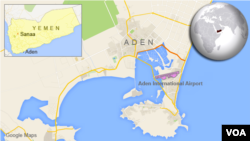Saudi Arabia said Saturday that at least 500 insurgent Shi'ites have been killed along the Saudi-Yemen border since a Saudi-led coalition launched airstrikes late last month against Houthi rebels seeking to gain control of neighboring Yemen.
A Saudi Defense Ministry statement also said three Saudi border guards were killed in a mortar attack Friday in the Saudi border province of Najran.
The statement did not provide details of how the death toll was tabulated. But a coalition spokesman earlier in the day said there had been 1,200 coalition airstrikes between March 26 and midday Saturday, including sorties on the southern port city of Aden that killed at least 22 people.
The airstrikes so far have failed to stop the Houthi rebel advance across the country.
Meanwhile, coalition warships shelled positions outside the southern city of Ataq, where Houthis and soldiers loyal to former President Ali Abdullah Saleh have gathered. Residents of the city reported airstrikes on a local military base.
In other developments, the Red Cross delivered nearly 36 tons of medical aid, water-purifying equipment and generators Saturday to the rebel-held Yemeni capital, Sana'a, the second successive day of such deliveries.
The U.N. humanitarian coordinator for Yemen, Johannes Van der Klaauw, told reporters in Geneva that a pause in the fighting of at least a few hours a day was desperately needed so more medical aid and other humanitarian assistance could get through. He called the situation in Aden "extremely, extremely preoccupying if not catastrophic."
The Iran-backed Houthis are battling forces loyal to the country's internationally backed president, Abd-Rabbu Mansour Hadi, who recently fled Yemen for Saudi Arabia.
More than 600 people have been killed in the fighting, and 100,000 residents have been forced to flee their homes.
On Friday, Doctors Without Borders said it had treated more than 800 wounded people across Yemen since March 19. It said the majority of those people have received treatment in Aden.
Separately, the parliament of Pakistan — a predominantly Sunni state that borders Iran — voted Friday to not join the Saudi-led coalition. Lawmakers instead unanimously backed a resolution urging a negotiated end to the violence.





